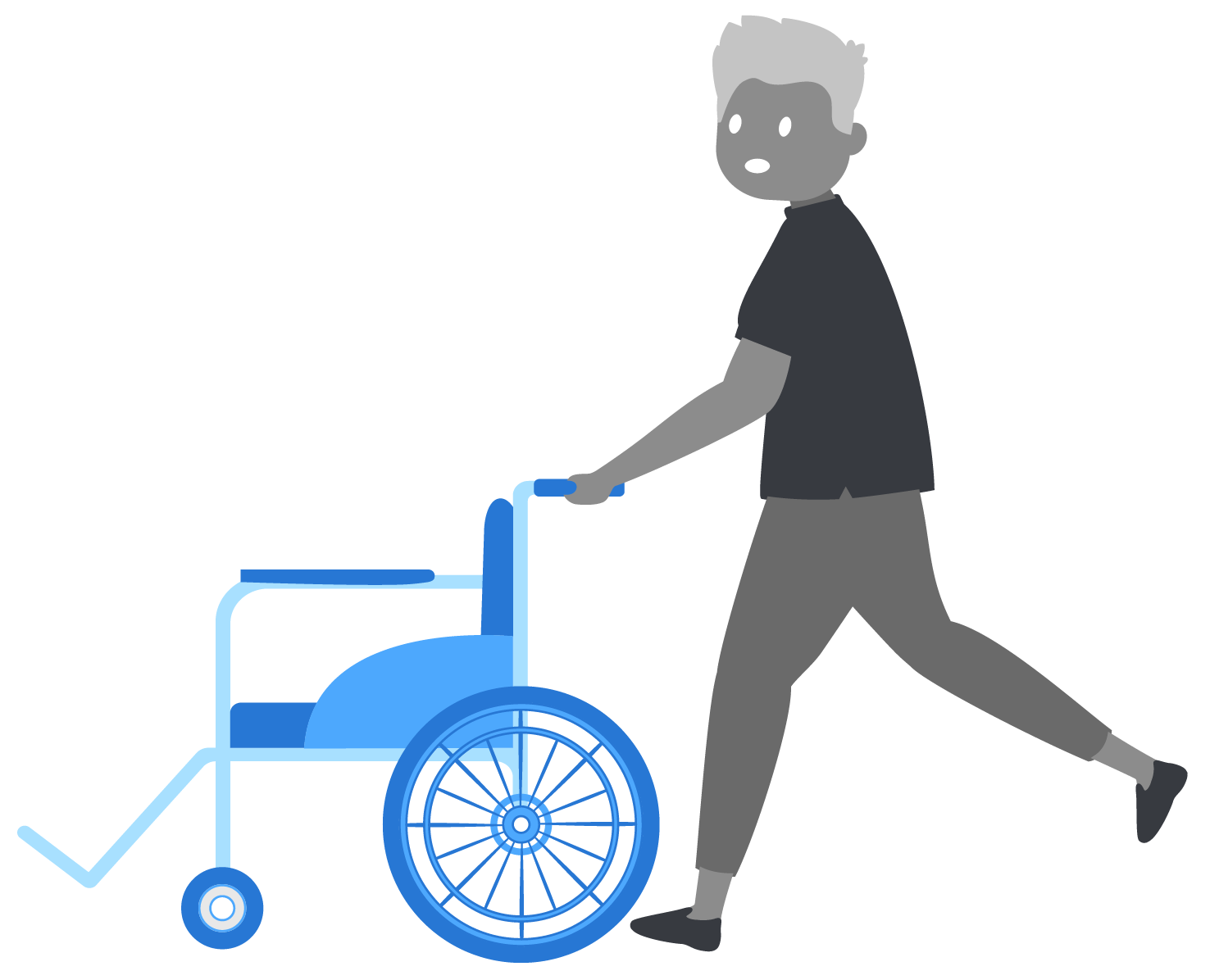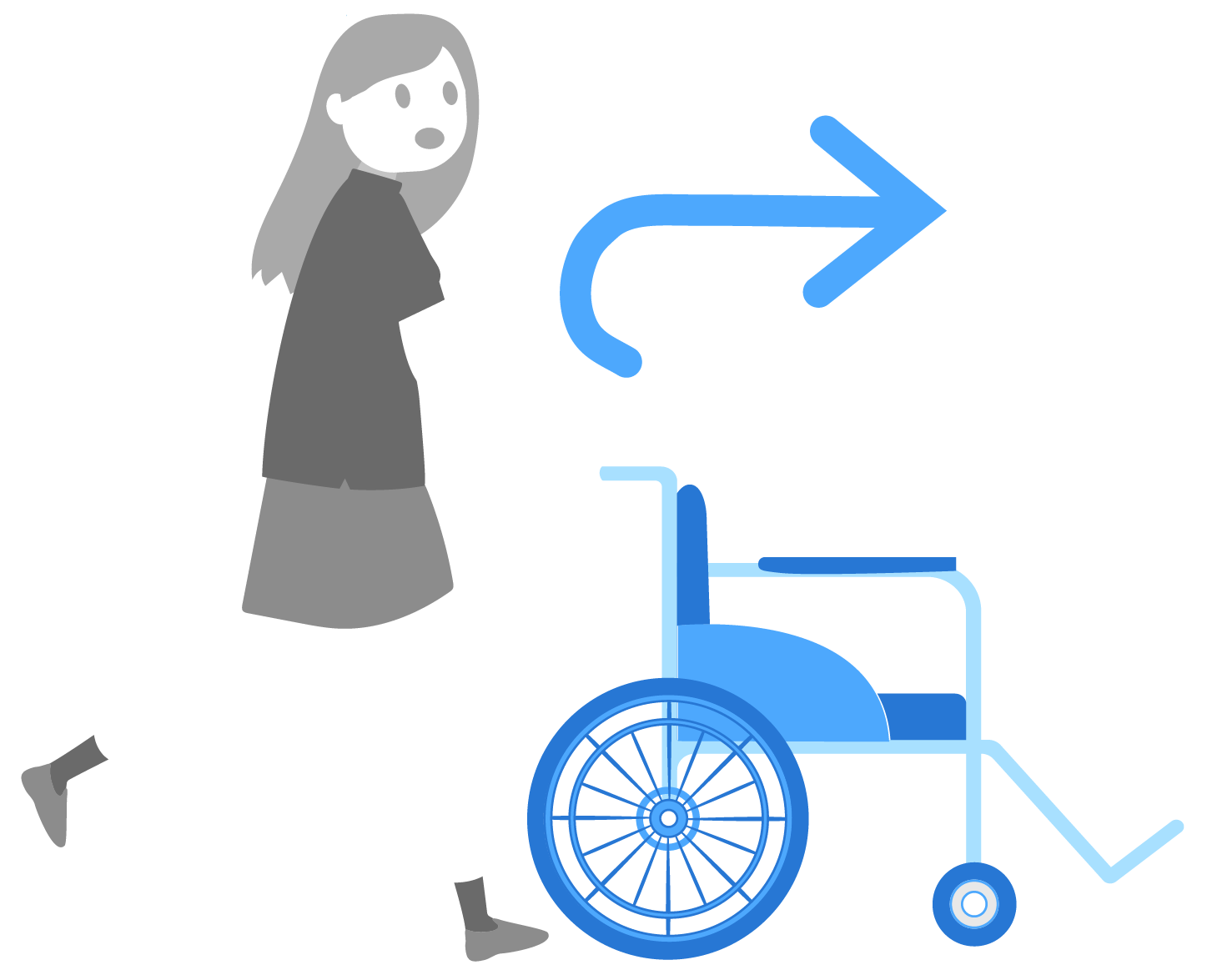What is MEPP?
Through the Medical Equipment Provision Program (MEPP), Health Authorities will be RENTING equipment on behalf of the client through the MEPP contracts.
There will be NO COST to the client.
Who Qualifies?

In order to qualify for MEPP, a client must:
- Have an equipment need
- Have no other identified funding source for that equipment (i.e. Extended Health Benefits, Veteran’s Affairs, ICBC, WSBC, Ministry, etc.)
- Require the equipment to remain safe AT HOME (not long-term care)
Who Supplies?

The Canadian Red Cross (CRC) will be the primary equipment provider, with alternate MEPP vendors throughout the province. The two alternate MEPP vendors for VCH are:
- BC Medequip Home Healthcare
-
Selfcare Home Health Products
(subcontracted HME Richmond and Coastability)
Equipment No Longer Available From The Red Cross
If the client requires a rental of any of the items below, the procurement will need to go through an alternate MEPP vendor.
- Power bath lift
- Trapeze bars
- Over bed table
- Grab bars
- Transfer Belts
- Bed blocks
- Viscous gel cushion
-
Low air loss and alternating
pressure mattresses
- Tilt in space wheelchairs
- Tilting commodes
- Self-propelling shower commode
- Personal backs for wheelchairs
- Transfer boards
- Wheelchair and walker trays
- Gel/foam combo cushion

Step 1: Determine What Equipment is Needed
When determining what equipment is necessary for your client, be sure to verify the following:
- What equipment is needed
- The length of time the equipment is needed
- The approximate cost to buy or rent (if the client chooses to self-pay for the equipment)
Step 2: Determine Who Will Pay
Begin by asking the client: "Is there 3rd party funding that can pay for the equipment?" and "Are you open to paying for the equipment yourself?" Be sensitive not to force clients to pay for equipment. There should be no undue pressure on the clients to pay for equipment. For a resource on how to navigate the funding conversation with clients, check out the PDF “MEPP Funding Script” in the “Other resources” section of https://my.vch.ca/mepp
- If 3rd party funding (i.e. Extended Health Benefits, Veteran's Affairs, ICBC, WSBC, Ministry, etc.) is not available and client is not open to paying for equipment themselves, follow the standard MEPP process in Step 3.
- If 3rd party funding is available, follow the 3rd party payer process for obtaining equipment in Step 3.

MEPP General Funding Process
Use the vendors in order as outlined in the Standard Work Stream Guideline (available on https://my.vch.ca/mepp). If a vendor cannot provide the equipment, proceed to the next option as outlined. It is important to follow the processes outlined in the standard work stream or specific process developed by operations leaders. This is to acknowledge that some local areas (particularly remote communities) have developed different processes due to service availability.
For all MEPP referrals you must complete a referral form AND equipment specification form. Go to the “Resources” section for instructions on how to complete these forms. If you are using a non-MEPP vendor, DO NOT USE MEPP forms. Instead, use the process already in place for your area.
Alternate MEPP Vendors

ONLY use alternate MEPP vendors when:
- VCH/PHC equipment loan cupboards or the primary MEPP vendor, CRC, cannot provide the equipment, OR
- Obtaining equipment through CRC will cause a client to wait in acute care longer than 24 hours, OR
- A client in the community is at risk of imminent hospitalization or injury and equipment from the CRC cannot be obtained timely enough to prevent this.
Additionally, keep these points in mind:
- When an alternate MEPP vendor is used, a manager must sign off on rentals exceeding 3 months for the following equipment: hospital beds, lifts, shower commodes, and tilt in space wheelchairs/ commodes.
- Manager approval for MEPP equipment will be operationalized differently at the local level, so follow the process developed by the manager/ director (i.e. Care Management Leaders or Patient Care Coordinators/Charge Nurses might sign off).
Clients with Long-Term Equipment Needs

For clients in need of equipment long-term, review the following steps to determine the correct process.
- Use CRC in all possible situations, unless CRC does not provide the type of equipment needed.
- If CRC equipment is not available when needed, use an alternate MEPP vendor for the short term and place client on waitlist for CRC equipment. You will need to complete two referrals: one to CRC to get the client on the waitlist and one to the alternate MEPP vendor for the short-term equipment.
Out of Health Authority Clients

Refer to Client Out of Health Authority Work Stream Guideline.
-
If the client is staying locally for medical care in VCH/PHC:
use the local address and follow the standard process (be sure to check off the client’s HOME Health Authority on the referral) -
If the client needs equipment to travel home:
use the local CRC depot and follow the standard process -
If client only needs equipment upon returning home:
You can access the CRC equipment in their community but the due date for referrals should not exceed 3 months. If you need equipment from an alternate MEPP vendor you must have a conversation with a clinician in the home health authority.
Palliative Clients

All palliative clients have access to CRC basic equipment through MEPP. For clients on BCPB program and eligible for palliative advanced equipment, follow the local processes already in place. For example:
- Vancouver clients will access MEPP CRC advanced equipment.
- Richmond clients will access palliative advanced equipment from HME Richmond.
- North Shore clients will access palliative advanced equipment from Self-Care.
- Coastal clients will access palliative advanced equipment through Coastability (or local process in place).
Orthopedic Discharges

When dealing with clients with orthopedic discharges, keep in mind the following points:
- Use the CRC standard process. However, if there is a delay getting equipment, use an alternate MEPP vendor.
- If the patient is part of the Oasis Program pre-op class, use the pre-populated MEPP forms in the EMR and request the clients to fill out their own demographic information. Refer to the OASIS Program Clients Guideline on the intranet if you have any questions.
- For post-op OASIS clients ask client if they have picked up equipment per the pre-op referral. Only issue a new MEPP referral if they have lost their pre-op referral or need additional equipment.
Clients Moving from Home to Long-Term Care

When clients move from home to long-term care, they will no longer be eligible for MEPP equipment. Arrangements must be made to have their equipment needs met in long-term care.
3rd Party Payer Process
If 3rd party funding is available, follow the Alternate Payer Work Stream Guideline for obtaining equipment. When working through the 3rd party payer process, if there are gaps in service (e.g., funder would not pay for rentals) or timing (e.g., equipment cannot be secured from 3rd party in a timely manner), then MEPP equipment can be accessed temporarily as a bridge until equipment is obtained through the 3rd party payer. If the client has the means to purchase or rent and expresses wish to do so, provide support to make it happen. For example:
- For government source funding: help client start the process.
- For non-government source funding: help client determine what is needed from the clinician for support (e.g. a letter of justification)

Delivery of Equipment
Regarding equipment delivery, keep in mind the following points:
- CRC basic equipment must be picked up by the client from any CRC depot.
- CRC advanced equipment will be delivered from the Richmond CRC depot (note: if only ordering smaller items from the advanced depot, such as ROHO cushions, these should be picked up by the client).
- For equipment from an alternate MEPP vendor, smaller items are to be picked up by the client, and larger items will be delivered by the vendor.
- If the client is unable to arrange pick-up/delivery of the equipment from either the CRC or an alternate MEPP vendors. use the most economical method of equipment delivery per local operations (i.e. taxi, local delivery service etc.).
Also note: when arranging delivery of equipment, a clinician is required to be present for the installation of lifts and floor-to ceiling poles.

Extension of Rental Equipment
If it is necessary to extend the rental of equipment, keep in mind the following information:
- Clients are to be given the Client Information sheet (available on my.vch.ca/mepp) to find out who to contact for an extension when the initial referral for equipment was made.
- Clients and/or vendors will notify a health authority representative to assess and complete an extension form if deemed appropriate. Go to the “Resources” section for instructions on how to complete the form.
- The equipment rental can be extended for up to three months. If the equipment rental will now be a long-term need, follow the processes for long-term equipment needs in the Standard Work Stream Guideline.

Return of Equipment
When returning equipment, remember the following information:
- CRC basic equipment must be returned by the client to any CRC depot.
- CRC advanced equipment will be picked up by the CRC and returned to the Richmond CRC depot. Note: if only small items, such as ROHO cushions, are ordered from advanced depot, these items should be returned by the client.
- For equipment from an alternate MEPP vendor, smaller items are to be returned by the client and larger items should be picked up by the vendor.
- If client is unable to arrange return of the equipment to either the CRC or alternate MEPP vendors, use the most economical method to return the equipment per local operations (e.g., taxi, local delivery service).
